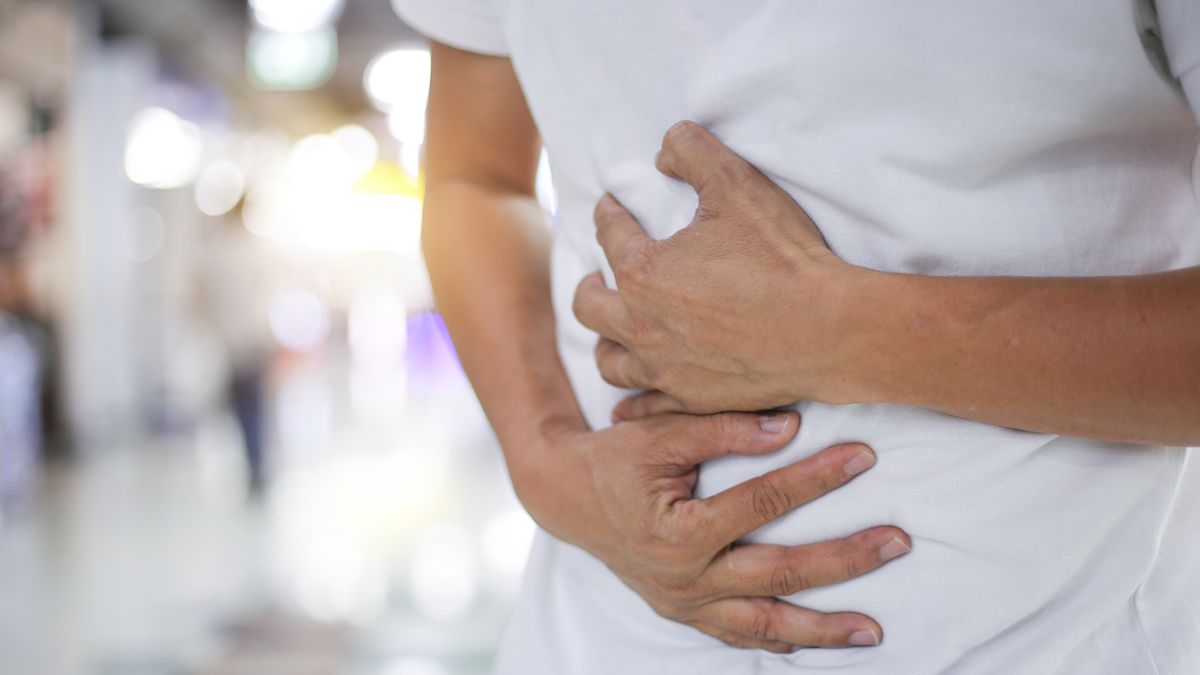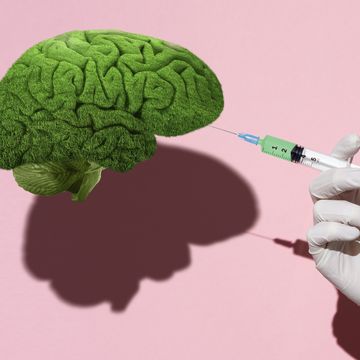There are few worse feelings than an upset stomach—especially around mealtimes. While some aspects like period cramps, the stomach flu, or even dehydration may cause temporary discomfort, if you find yourself asking: “Why do I feel sick every time I eat?”—there may be something more serious at play.
Before you start trying all the best cures for nausea on the internet, there are a number of short-term reasons that may be behind your upset stomach—from acid reflux to food poisoning to simply eating too much. “If you overeat a massive holiday meal and feel a bit queasy which improves on its own, there is little concern,” explains Niket Sonpal, M.D., a board-certified gastroenterologist and assistant clinical professor at the Touro College of Osteopathic Medicine in NYC. “But if you notice nausea regularly (more than one to two times per week) then it’s reasonable to be concerned and see your friendly neighborhood GI doctor.”
Meet the experts: Niket Sonpal, M.D., a board-certified gastroenterologist and assistant clinical professor at the Touro College of Osteopathic Medicine in NYC; and Hugh Humphery, M.D., functional medicine practitioner and Everlywell advisor
Causes of nausea after eating
“Nausea is a symptom that can occur due to many underlying root causes, but if it specifically occurs after eating, it likely is due to abnormalities in the gastrointestinal system,” explains Hugh Humphery, M.D., functional medicine practitioner and Everlywell advisor. Other potential causes, he adds, are mental health-related. Some of these common disruptive conditions are:
Acid reflux and GERD
Acid reflux happens when stomach acids bubble up into your esophagus and throat, often after eating. The occasional bout—especially after eating spicy foods—is expected, but if you’re experiencing it regularly, you could have what’s known as gastroesophageal reflux disease (GERD), which can also come with nausea and bloating. Food sensitivities and a “leaky gut” or intestinal permeability are additional possible complicating factors, adds Dr. Humphery.
Anxiety and stress
“Anxiety, depression, or intense stress can also result in a loss of appetite and nausea after eating,” says Dr. Humphery. Everyone has different physical reactions to the body entering “fight or flight” mode, and research shows that stress and anxiety have a direct effect on colonic movements and how hormones interact with the GI tract. Other symptoms that may coincide with this type of upset stomach are fatigue, muscle aches, and restlessness, Dr. Humphery says.
Irritable bowel syndrome
Irritable bowel syndrome, or IBS, “affects the small bowel and the large bowel,” Dr. Sonpal explains. If, in addition to nausea, you also experience changes in your bowel habits or symptoms like abdominal pain or bloating, then you might have IBS, according to Dr. Sonpal.
Gastritis
Dr. Humphery says gastritis is characterized by inflammation of the stomach lining, which, according to the Mayo Clinic, may also come with abdominal pain, nausea, and a sensation of fullness in the upper abdomen after eating. “If vomiting occurs for more than 24 hours or there are signs of dehydration or serious illness such as high fever, one should consult their doctor immediately,” Dr. Humphery adds.
Ulcer
An ulcer is an open sore that develops on the stomach’s inner lining, and can cause nausea, heartburn, stomach pain, bloating, and an intolerance of fatty foods, per the Mayo Clinic. Dr. Humphery says it, therefore, can be linked to nausea after eating.
Gastroparesis
Gastroparesis, which affects various nerves and muscles, is a condition that causes paralysis of the stomach, per the Cleveland Clinic. It most often occurs “when certain medications, or more commonly diabetes, destroys the ability of the stomach to sense stretch,” explains Dr. Sonpal. “Stretch gives the stomach the signal to start moving and digesting. Without stretch...food sits there, and you get nausea and likely will throw up.”
Viral infection
If you’ve ever had a stomach bug and struggled to keep any food down, you’ve experienced this specific type of post-meal nausea. This is commonly known as the stomach flu and also often comes with diarrhea, cramping, and fever, per the National Institute of Diabetes and Digestive and Kidney Diseases.
Hormonal changes
Hormonal changes, particularly during pregnancy, can cause nausea after eating, says Dr. Humphery.
Food allergies or intolerances
This may seem like an obvious one, but food allergies can cause adverse reactions, including nausea, Dr. Humphery explains. They may also come with skin discomfort and itching, he adds.
Food poisoning
Though this wouldn’t explain nausea every time you eat, if you are experiencing it acutely for a number of days, food poisoning may be to blame. It usually occurs within six to 24 hours of eating spoiled or contaminated food, explains Dr. Sonpal, who adds that it often causes nausea as well as vomiting, diarrhea, and/or a fever.
Medication
Sensitive stomach or not, certain medications may have side effects that include nausea. In terms of medication, “everyone is different and theoretically anything can make you nauseated,” Dr. Sonpal says. He adds that the most common medications that tend to cause nausea are antibiotics, antidepressants, aspirin, ibuprofen, naproxen, medicines used to treat cancer (chemotherapy), opioid pain medicines, and vitamins and mineral supplements, such as iron.
Treatments for nausea after eating
“The cause of your nausea will determine how you treat and prevent it,” says Dr. Humphery. “Consider keeping a food diary if you commonly experience nausea after eating and aren’t sure of the cause.” He also recommends getting fresh air, deep breathing meditation, taking an over-the-counter antacid like TUMS, and avoiding intense physical activity after a meal.
To prevent feeling uneasy in the first place, he suggests eating and drinking more slowly, avoiding spicy, fried, and greasy foods, and eating small meals spread out throughout the day rather than two or three larger ones.
When to see a doctor
“If your nausea does not go away within a week, call your doctor to discuss your symptoms,” says Dr. Humphery. “If your nausea is accompanied by blood in your vomit or stool, high fever, chest pain, extreme thirst and jaundice, or yellowing in the eyes or skin, you should contact your doctor immediately.”

Kayla Blanton is a freelance writer-editor who covers health, nutrition, and lifestyle topics for various publications including Prevention, Everyday Health, SELF, People, and more. She’s always open to conversations about fueling up with flavorful dishes, busting beauty standards, and finding new, gentle ways to care for our bodies. She earned a bachelor’s degree in journalism from Ohio University with specializations in women, gender, and sexuality studies and public health, and is a born-and-raised midwesterner living in Cincinnati, Ohio with her husband and two spoiled kitties.

Shannen Zitz is an Assistant Editor at Prevention, where she covers all things lifestyle, wellness, beauty, and relationships. Previously the Editorial Assistant at Prevention, she graduated from the State University of New York at Cortland with a bachelor's degree in English. If she’s not reading or writing, you can probably find her frequenting the skincare and makeup forums on Reddit or hogging the squat rack at the gym.












